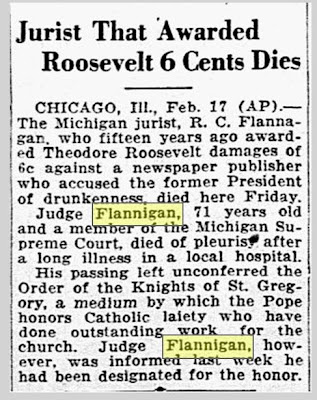Richard C. Flannigan, presiding judge in the 1913 libel case
brought by former President Theodore Roosevelt, served for the next fourteen
years as Circuit Court judge in his district. While he was long recognized for
his skill and wisdom, no other case may have brought him the national
recognition that this incident afforded him. Described as presiding over a “jewel box of a courtroom” with its “paneled and gilded chamber crowned with a dome of
stained glass,” Judge Flannigan’s every decision in the matter was reported as
it unfolded, in newspapers from the Upper Peninsula to New York to Washington,
D. C.
While Theodore Roosevelt’s day in court may have resulted in
a six cents judgment—actually being “nominal damages” as defined by the State
of Michigan
at that time—the cost to the plaintiff far exceeded that token award. The
result of Mr. Roosevelt’s desire to clear himself of such frivolous charges had
amounted to forty thousand dollars—a sum for which his wife bemoaned the “family
pocketbook would flap emptily in every breeze.”
Despite the notoriety of the unusual event, the furor in Marquette came and went,
and court proceedings continued as usual for the remainder of Judge Flannigan’s
term. Fourteen years later, though, serendipity presented itself once again
when a Michigan Supreme Court Justice resigned his post. Michigan’s
Governor Fred Green called upon the Marquette
jurist to fill the position, appointing Richard Flannigan on September 29, 1927.
Quickly responding to the call, Justice Flannigan assumed
his duties at the state capital on October 4 of that year. However, not long
after arriving in Lansing, an illness caused him
to seek treatment at a Chicago
hospital, where he remained several weeks. Disregarding medical advice, he felt
the need to resume his duties, during which time he wrote a number of opinions which
were “unanimously concurred in by all the other members of the Court.”
In January 1928, Richard Flannigan assumed the office of
Chief Justice of the Supreme Court of the State of Michigan. That honor was not to be held for
long, though, as illness struck once again. Returning to Mercy
Hospital in Chicago to seek treatment for pleurisy, after
three weeks of medical care, he passed away on the seventeenth of February.
Perhaps owing to the aura of that exuberant personality that
once graced his Marquette
courtroom, R. C. Flannigan’s passing did not go unnoticed. Headlines again
picked up the Associated Press story of the jurist who had once presided over
the courtroom scene of the aggrieved Mr. Roosevelt. Dallas,
New York, and others reported the loss of the
Six Cent Jurist, an interesting passage of Upper Peninsula local color—and a
mourned loss for the State of Michigan.

I love the expression "jewel box of a courtroom". Those old guilded and carved old buildings from that era are gorgeous! The trial must have been quite the "drama" in those days!
ReplyDeleteCurious about the personal expenses of the president defending his honor! $40,000 to prove he was not a drunk! Poor Mrs Roosevelt!
Interesting bits of history:)
ReplyDeleteNo wonder the "public servants" loose sight of the fact that they are there to serve the public...
ReplyDeletePleurisy sounds pretty dreadful.